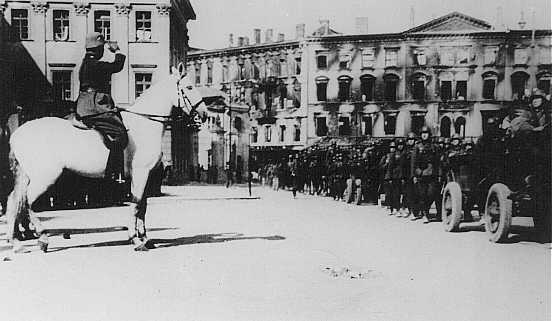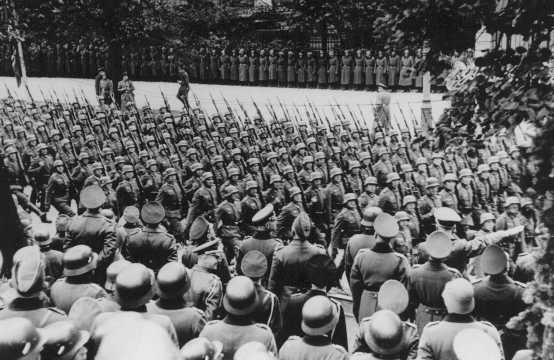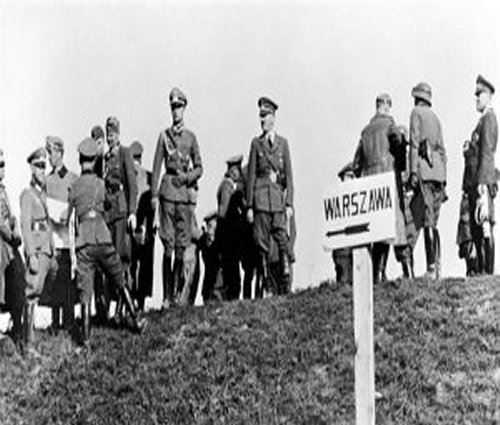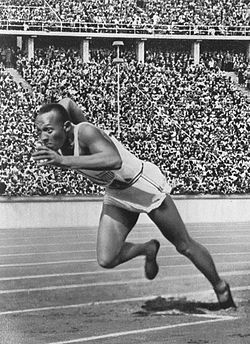Thursday 5 October 1939
 |
| German soldiers parade in Pilsudski Square. Warsaw, Poland, October 5, 1939. |
Hitler reviews the victory parade in Warsaw, then returns to Berlin, where he delivers a victory speech. Leni Riefenstahl films it for later use.
Western Front: The French broadcast a report of a battle in the Moselle Valley.
Soviet-Latvian Relations: The two countries conclude a Mutual Assistance Treaty whereby the Soviets gain naval and air bases.
Soviet-Finnish Relations: The Soviets request boundary talks with the Finns.
Battle of the Atlantic: British and French warships are looking for the Admiral Graf Spee in the South Atlantic. The Graf Spee sinks the British vessel Beech.
The German pocket battleship Deutschland, meanwhile, is on the loose in the North Atlantic and sinks the SS Stonegate west of Bermuda.
The French detain the US freighter Exeter and release the US freighter City of Joliet after an examination.
Germany detains the Swedish "Korsholm," Estonian "Minna" and Norwegian "Brott" at various ports on suspicion of carrying US war cargo.
Convoy OA 15 departs Scotland and OB 15 departs Liverpool.
German Propaganda: "Der Sturmer" published a "Hymn of Hate" against England.
French Government: The government arrests 26 Communist deputies in the Chamber of Deputies.
Sweden: The Swedish government announces that it will arm its cargo vessels.
China: The First Battle of Changsha continues, with the Chinese 9th War Area attacking Chiuhsientang and withdrawing elsewhere across the Hsiu River.
 |
| Adolf Hitler (lower right) gives a salute - later known as a Hitler salute - as he reviews German troops. Warsaw, Poland, October 5, 1939. Wide World Photo |
October 1939
October 1, 1939: Occupation of WarsawOctober 2, 1939: Hel Peninsula Falls
October 3, 1939: The Diamantis Incident
October 4, 1939: Otto Kretschmer Gets Rolling
October 5, 1939: Polish Resistance Ends
October 6, 1939: Hitler Peace Effort
October 7, 1939: The British Have Arrived
October 8, 1939: First RAF Kill from UK
October 9, 1939: "City of Flint" Incident
October 10, 1939: Lithuania Under Pressure
October 11, 1939: The Atomic Age Begins
October 12, 1939: England Rejects Hitler's Peace Offer
October 13, 1939: Charles Lindbergh Speaks Out
October 14 1939: Royal Oak Sunk
October 15, 1939: Cuban Rockets
October 16, 1939: First Aircraft Shot Down Over UK
October 17, 1939: Marshall Mannerheim Returns
October 18, 1939: Prien Receives His Award
October 19, 1939: Preliminary Plan for Fall Gelb
October 20, 1939: Hitler Grapples with the Jews
October 21, 1939: Hurricanes to the Rescue!
October 22, 1939: Goebbels Lies Through His Teeth
October 23, 1939: Norway the Center of Attention
October 24, 1939: German "Justice" Gets Rolling
October 25, 1939: Handley Page Halifax Bomber First Flies
October 26, 1939: Jozef Tiso Takes Slovakia
October 27, 1939: King Leopold Stands Firm
October 28, 1939 - First Luftwaffe Raid on Great Britain
October 29, 1939: Tinkering with Fall Gelb
October 30, 1939: Defective Torpedoes
October 31, 1939: Molotov Issues an Ultimatum
2019





